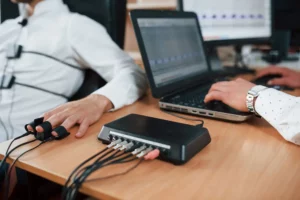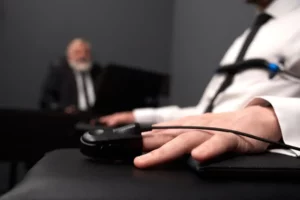When your credibility or innocence is on the line, you want to be sure you are getting an accurate and fair polygraph test from a qualified examiner. Choosing the right professional to conduct your examination could impact the rest of your life, so it’s important to do your research. Follow this guide to locate and vet polygraph examiners to find one you can trust.
Understand How Polygraph Tests Work

To select the best examiner, you’ll need a basic grasp of what happens during a polygraph. The test measures changes in your:
- Breathing rate
- Blood pressure
- Heart rate
- Sweat gland activity
As you answer questions, sensors will detect your body’s involuntary “fight or flight” response which may indicate deception.
The polygrapher will ask control questions and more pointed questions relevant to the investigation. Your reactions will be compared. An honest subject typically shows more concern during the control questions.
Verify Proper Training and Licensing
Your examiner should have completed a basic polygraph examiner course of at least 6 weeks from an accredited school. Many reputable examiners will have undertaken 200+ hours of initial training.
Verify any licensing required by your state and confirm the licensing body has not taken disciplinary action against the examiner previously.
Ask how often the examiner pursues continuing education and training. Equipment and techniques evolve, so it’s vital they stay current.
Look for Substantial Experience

Choose an examiner who has conducted at least 200 polygraph tests, with over 5 years of experience preferred. Ask how many tests they’ve done related to your particular purpose, such as criminal investigation or employee screening.
General experience levels to look for:
- 5+ years: Have established competency across various test types.
- 10+ years: Extensive knowledge and caliber to handle complex cases.
- 15+ years: Often the most skilled senior examiners. Have seen many atypical situations.
Research Their Reputation
A credible and skilled examiner will have a trail of satisfied customers and respected peers. Some signs to look for:
- Online reviews: Search the examiner’s name to see feedback from past clients. Look for consistently high ratings.
- Professional memberships: Many join associations like the American Polygraph Association to stay current.
- Police contacts: For criminal cases, look for examiners that detectives recommend and collaborate with regularly.
- Local recognition: Established experts may have gained press coverage or awards.
- Client base: A robust and diverse client history indicates an in-demand examiner.
- Industry interaction: They may teach polygraph courses/seminars or author publications.
Know What Disqualifies a Polygrapher

Avoid examiners who display these red flags:
- Previously revoked or suspended license
- History of unethical conduct
- Excessive customer complaints
- Lacks accredited basic training
- Cannot provide proof of experience
Also beware of newly trained examiners looking to rapidly build clientele. Opt for proven expertise.
Ask the Right Questions Up Front
Before committing, have an open discussion about qualifications, methods, and your case details.
Based on what we discussed, key questions to ask:
- What training program did you graduate from? When?
- How many years have you administered polygraphs? How many tests?
- What ongoing education do you pursue?
- What is your experience with tests related to my purpose?
- Which methods and question formats do you use?
- Do you have a proven record of accuracy?
- What professional associations do you belong to?
- Can you provide references from past clients?
A vague, defensive or complex response can be a red flag.
Look for Strong Policies and Processes
![]()
A diligent and standardized approach indicates a careful and methodical examiner.
- They should explain their testing process and policies upfront.
- Tests should be conducted in a controlled, distraction-free setting.
- Question sets should be customized based on case details.
- Pre-test interviews should be thorough yet compassionate.
- Results and reports should be comprehensive yet clear.
- An interpreter must be provided if needed.
Make Sure Your Rights are Respected
While licensing ensures basic morality, you have additional rights that a reputable examiner will honor:
- You can stop the test at any time if you feel ill or need a break.
- You may record the audio of the entire exam. Just disclose upfront.
- Don’t answer personal questions unrelated to the test purpose. Redirect the examiner politely.
- Review credentials like licenses and training certs in person if desired.
- Get references and have a consultation before committing.
- There should be no pressure to proceed before you are ready.
Watch out for any hesitation to accommodate these requests. All legitimate examiners will respect your rights.
Trust Your Instincts
Even if an examiner checks all the boxes, go with your gut. Look for:
- Honest, direct communication: They should educate you without sounding evasive or condescending.
- Professional yet supportive manner: A compassionate demeanor puts subjects at ease for accurate results.
- Patience and flexibility: They allow time for questions and schedule changes if reasonable.
You want an examiner that makes you feel confident, not anxious. Don’t ignore uneasiness – keep looking until you find the right fit.
Ask About Their Testing Location

The location where your polygraph examination takes place also matters when assessing an examiner. Some things to ask:
- Is the testing facility professional and private? Exams should occur in a controlled, neutral environment free of disruptions and distractions. An office or suite dedicated to polygraph testing is ideal. Home offices or makeshift spaces may lack rigor.
- Is the equipment well-maintained and recently calibrated? Old analog machines or gadgets that appear haphazardly rigged up should raise some red flags. Look for a proper polygraph chair and clean, organized digital equipment. Reputable examiners invest in their tools.
- Does the location meet legal standards? Some states prohibit testing at your own home or residence. The space should also allow for confidentiality if requested.
- Is the facility accessible and accommodating? Those with disabilities or limitations may require a location with wheelchair access, translators, or other needs met. A compassionate examiner ensures accessibility.
Tour the testing facility in-person whenever possible, even if just the waiting area. This gives you a feel for their professionalism before your appointment.
Understand How You’re Matched to the Examiner
For fair results, you’ll want an examiner free of inherent biases. Responsible polygraphers avoid:
- Testing family members, close friends or associates
- Cases where they have a personal stake or opinion
- Situations where they cannot remain fully neutral
You can request a different examiner if you have concerns over potential conflict of interest or lack of objectivity. Just be reasonable – an association with their employer does not necessarily disqualify them.
Consider Their Testing Process
The process used can impact accuracy. Here are some best practices to look for:
- Pre-Test Phase: This includes an in-depth interview to identify case details and prepare customized test questions. This phase can last 60-90 minutes. Rushed interviews may overlook vital context.
- In-Test Phase: The examiner observes you closely while administering test questions and changing up order/phrasing. Skilled examiners stick to a structured approach while also reading body cues. Sessions usually run 1-4 hours.
- Post-Test Phase: The examiner analyzes your results, conducts an interpretive interview, and allows you to explain reactions. This builds an open dialogue around the findings.
Results should never be provided on the spot – professional scoring and analysis takes time.
Consider Specialized Abilities

For complex or sensitive cases, seek examiners with particular skills/experience such as:
- Bilingual examiners – If English is not your native language, test accuracy improves with an examiner fluent in your tongue. They read cues and nuance better.
- Juvenile experience – Testing children and teens requires extra care, sensitivity and established rapport. Not all examiners work with youth.
- Sex crime expertise – Examiners experienced with sensitive assault cases know how to ask probing questions judiciously to uncover truth and minimize victim trauma.
- Countermeasures detection – Skilled examiners can identify attempts to manipulate results through techniques like muscle tensing or tongue biting. They adapt the questions to compensate.
Find an examiner whose expertise directly aligns with your unique situation.
Understand How to Interpret Results
While examiners provide expert analysis, understand that polygraph results are not absolutely definitive in confirming truthfulness:
- Deception indicated – This means the test uncovered significant physiological reactions to relevant questions. But reactions vary person-to-person, so it’s not a certain sign of lying.
- No deception indicated – The absence of significant reactions to key questions suggests truthfulness. But the results should undergo peer review for confirmation.
- Inconclusive – The test did not reveal clear or consistent patterns. This warrants retesting by a new examiner.
An unbiased examiner provides the probability of deception but notes results are ultimately opinion-based. Look for nuance versus a black-and-white stance.
Recognize Your Rights are Protected
Any licensed professional must uphold your rights as a test subject. You always have recourse if you experience:
- Pressure to submit to an involuntary or coercive exam
- Testing without proper consent
- Intimidation or abusive conduct
- Unprofessional comments based on gender, race, etc.
- Physical contact beyond placing sensors
- Denial of your rights – to stop the test, record it, etc.
Report unprofessional and unlawful conduct to the proper licensing body for investigation. Your experience can protect others.
With thousands of polygraph examiners to choose from across the country, take time to research and compare your options to find one that meets your standards of quality, experience and integrity. The examiner you select can truly alter your destiny, so invest the effort to get it right. Trust the guide above and let your instincts safely point you towards the legitimate expert that best fits your needs.

